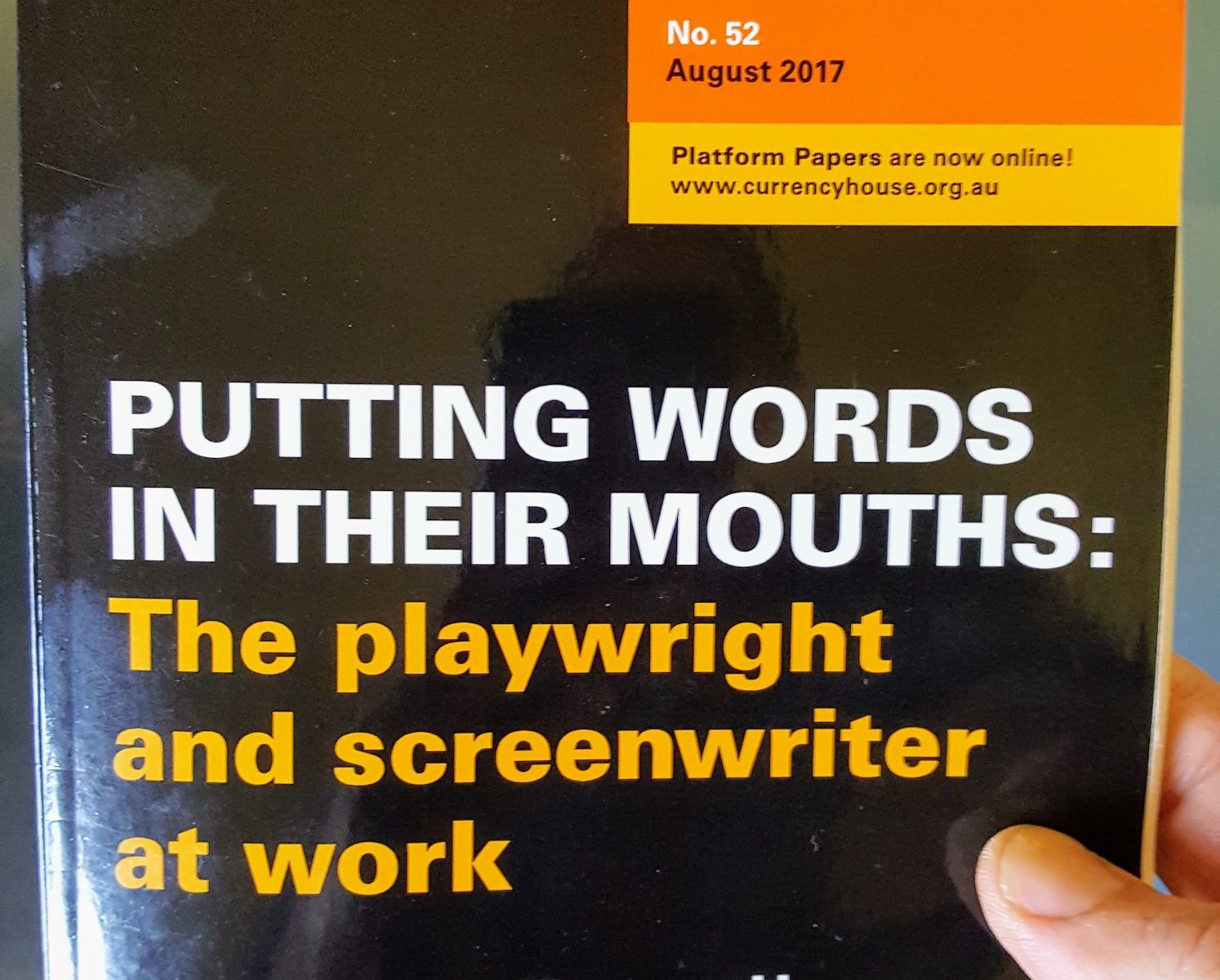Andrew Bovell’s Platform Paper, Putting Words in their Mouths: the playwright and screenwriter at work, was published in August this year, and I’ve finally made the time to read it. Andrew is one of Australia’s finest dramatists, and is as generous, thoughtful and intelligent a person as you would hope to meet.
His essay on his work and his life at work reflects these qualities. There is so much to love in the 74 pages published by Currency House, but here are five of my responses.
In the notes below, I’ll refer to the master as both Andrew and Bovell. I hope he doesn’t mind. I hope you don’t mind either.
1) Making plays is about making relationships. Theatre is not just about playwriting. Any production is the outcome of the play of disciplines that coalesce around the idea of the play – playwright, actor, designer, technicians, musicians
Great theatre comes out of the relationship between these disciplines and our theatre companies are able to bring them together under the same roof.
Andrew then highlights trends in Australia to bring playwrights under the roof in a couple of established companies, Sydney Theatre Company and Melbourne Theatre Company in particular.
To contrast for a moment, UK theatre culture probably leans too heavily on the centrality of the playwright, to the extent that a playwright like me can end up a Writer-in-Residence at a hotel. The good of it can mean that playwrights take more responsibility for what they offer, but the bad of it is that other elements can get a bit sidelined (unless it’s another production from Robert Icke or Rupert Goold!)
2) Writer’s block is a bitch – and it’s inevitable.
I have learned to accept it as an inevitable part of the process. It is a forced time to reflect on my approach to my work. And in the end there is only one solution – to keep writing.
If you are suffering from a block, take as much solace as you can from the thought that you sit in great company. (And I’ve a few ideas for writing your way back into a project in this earlier post on craft.)
3) If and when success – however you measure it – comes, it is difficult for even the best of playwrights and screenwriters not to be flattered by offers of work, and to pressure themselves into taking on too much.
I’m older now and more discerning. I’m not so easily flattered and I say ‘No’ more often than not. I take on the projects that count and I no longer fear that the phone will stop ringing. I’ll be ok if it does.
That’s an attitude to aspire to. The attitude also reminds me of how every single friend (and myself when I was single) usually meets somebody decent when they no longer fear rejection and seem comfortable with the idea of living alone.
There you go. Writing and dating advice in one post. It’s your lucky day.
4) It is via a playwright’s rhythms, the play of dialogue, where you find that elusive thing called the playwright’s voice.
When I read the work of a new writer I look for an understanding of the rhythms of spoken language. For me, how something is said is as important as what is said… My characters often speak as if they are unsure of what they are trying to say. It is as if they are discovering what needs to be said while they are saying it. It’s the dance of language. Good playwrights understand this and each has their own dance and song that they sing.
Andrew puts this so beautifully that I’m inclined to drop the term “playwright’s voice” for “playwright’s dance”. A musicality of dialogue opens up ways for actors to play their instrument, i.e. their body.
I think back to my own early experiences with rehearsals, and some of my dialogue on the page sent directors or actors mad until they spoke and heard it. The back and forth. The missteps and the deliberate stumbles.
Personally, I come from a musical background – when I was a kid I dreamed of being a composer surrounded by synthesisers and drum machines gone Stravinsky. What I write I often edit more to fit rhythms that I sense, less to adhere to ideas of character motivation or intellectual engagement. I often hope that the rhythms will motor all the other elements, but that’s another story.
5) Bovell writes like Pinter (and the late Michael Gurr) – a character says a sentence, it’s answered by another utterance, and the process of writing the play is questioning those speeches, until the world of the play and its story unfurls.
The comparison Bovell uses is sculpting a lump of wood, discovering the grain and the knots, and while you might have started out trying to carve out a house, “you can follow the grain and use the know and discover you’re carving a boat instead.”
The first four lines of dialogue that he wrote for When the Rain Stops Falling, he “look[s] at those four lines now, almost written blind, and I can see the whole play in them.”
The idea of emotional distance emerged in this snatch of dialogue. I then asked myself why. What caused it? Writing is the process by which you ask yourself a series of questions. In answering one question, another is posed.
I wish I could write in this way. Or have the patience to push on and interrogate such snatches. In contrast, my process of playwriting usually builds up to the point where I feel I know the world and characters and their stories well enough to start the dialogue.
Maybe that’s because of my family’s influence on the idea of craft. A big part of my family’s background was in the building trades – the rhythm of which is preparation, preparation, preparation, ‘work’, then cleaning, cleaning, cleaning. Tiling, for example, is about 98% preparation and cleaning, and only about 2% adhering the tiles in the middle of it. I am not a sculptor, but I love playwrights who are. And I’m partial to a bit of tiling.
—
Note about the photo: you might see my reflection in the gloss cover. Apologies.
Question: I have quite a few ideas for future posts, but I’m keen to hear from you if you have a question about writing. Or you just want to tell me your particular problem. A problem shared…

